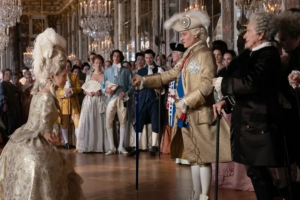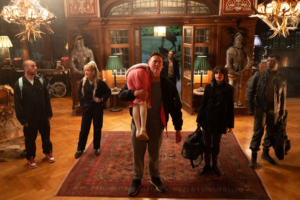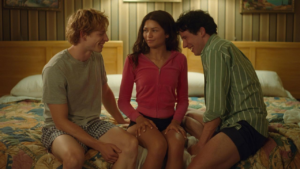Reviewed by GREG KING
Director: Michael Engler
Stars: Haley Lu Richardson, Elizabeth McGovern, Campbell Scott, Geza Rohrig, Miranda Otto, Blythe Danner, Andrew Burnap, Matt McGrath, Robert Fairchild, Tyler Weakes, George Hampe.

In the 20s Louise Brooks was one of the most famous movie stars in the world. She made seventeen silent films and eight talkies before retiring in 1933. A couple of her films, like 1929’s Pandora’s Box, directed by G W Pabst, are regarded as classics of the silent era. While plenty is known about her film work, little is known about her life before she became famous. This modest little film does not provide a lot of information.
The film is based on the 2012 best-selling novel written by Laura Moriarty, which has been adapted to the screen by Julian Fellowes (Downton Abbey, etc). He gives the material something of an old-fashioned feel.
The film offers up a fictitious treatment of Brooks’ early years as the 16-year-old aspiring actress (played here by Haley Lu Richardson, from Five Feet Apart, etc) took her first steps on the path to stardom. She left her stuffy hometown of Wichita, Kansas, to travel to New York for a dance scholarship at the prestigious Denishawn School of Dancing and Related Arts to study under the famed Ruth St Dennis (Miranda Otto). Her mother permitted the trip only if she was accompanied by a suitable chaperone.
Louise was accompanied to the bustling New York by the dowdy and sexually repressed Mrs Norma Carlisle (Elizabeth McGovern, from the tv series Downton Abbey, etc), who leaves behind her husband Alan (Campbell Scott) and family when she embarks on this life changing journey. But The Chaperone focuses more on Norma and her journey of discovery as she revisits the former Catholic orphanage where she was raised, finds her biological mother (a cameo from Blythe Danner) and finds love with Jack (Geza Rohrig, from the holocaust drama Son Of Saul, etc), the German emigrant who works as a handyman at the orphanage. We get glimpses of Norma’s past and her troubled relationship with Alan through a series of sepia hued flashbacks, but these hardly elevate the material.
There is even a blossoming romance between Louise and Floyd (Andrew Burnap, in his film debut), the handsome young law student who works part time at a local café.
The performances of the two leads lifts the material though. McGovern is excellent as the stuffy and conservative Norma, who undergoes a great change in outlook and attitude and becomes more liberated. She is a fictionalised version of the real-life woman who accompanied the young Brooks on her journey. Richardson is good as the flighty and precocious young Brooks, a free-spirited woman ahead of her time and eager to escape the confines of small-town America. She captures her boundless energy, spirit, sexuality and mystique, and even sports her distinctive and iconic bobcut hairstyle. The two play up the contrasts and the battle of wills between them to create an engaging and sometimes witty dynamic.
The Chaperone marks the feature film directorial debut for Michael Engler, a veteran of television having worked on series such as Sex And The City, Party Of Five, and 30 Rock, etc, and his background shows in the film’s limited ambition. His direction though is pedestrian, and the film lacks any real sense of energy or urgency. This is a handsomely mounted production though, with authentic period detail and lush production design from Andrew Jackness (The Black List, etc) that recreates New York of the Roaring 20s. Candice Donnelly’s costume design also richly evokes the era. The film has been nicely shot by Nick Remy Matthews (the recent Hotel Mumbai, etc).
There is probably a great biopic waiting to be made about Brooks and her impact, but unfortunately the dry The Chaperone isn’t it.
★★★



